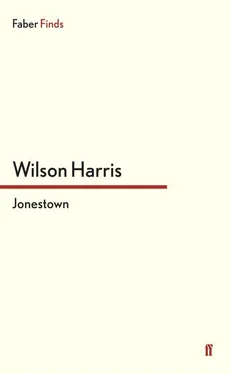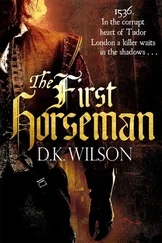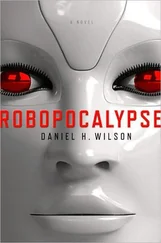Wilson Harris - Jonestown
Здесь есть возможность читать онлайн «Wilson Harris - Jonestown» весь текст электронной книги совершенно бесплатно (целиком полную версию без сокращений). В некоторых случаях можно слушать аудио, скачать через торрент в формате fb2 и присутствует краткое содержание. Год выпуска: 2011, Издательство: Faber & Faber, Жанр: Современная проза, на английском языке. Описание произведения, (предисловие) а так же отзывы посетителей доступны на портале библиотеки ЛибКат.
- Название:Jonestown
- Автор:
- Издательство:Faber & Faber
- Жанр:
- Год:2011
- ISBN:нет данных
- Рейтинг книги:5 / 5. Голосов: 1
-
Избранное:Добавить в избранное
- Отзывы:
-
Ваша оценка:
- 100
- 1
- 2
- 3
- 4
- 5
Jonestown: краткое содержание, описание и аннотация
Предлагаем к чтению аннотацию, описание, краткое содержание или предисловие (зависит от того, что написал сам автор книги «Jonestown»). Если вы не нашли необходимую информацию о книге — напишите в комментариях, мы постараемся отыскать её.
Jonestown — читать онлайн бесплатно полную книгу (весь текст) целиком
Ниже представлен текст книги, разбитый по страницам. Система сохранения места последней прочитанной страницы, позволяет с удобством читать онлайн бесплатно книгу «Jonestown», без необходимости каждый раз заново искать на чём Вы остановились. Поставьте закладку, и сможете в любой момент перейти на страницу, на которой закончили чтение.
Интервал:
Закладка:
It was a poignant parable of appearances. Why Bread? Why should poor Bread speak for gold, or diamonds? Why should a parable of brute appearance not dress itself up in august, imperial robes, why ride on the back of weak Bread? Unless Bread itself is susceptible to predatorial instincts and needs the administration of a saviour-Child as much as a saint?
These are riddles of evolution I am unable to solve except that Bread leaps, even as it crumbles, fish leaps, fire blazes and leaps even as a waterfall evolves through fossil apparitions of Rock in cosmic and geological theatres of appearance …
Long before Jonestown, November 1978, Marie of Port Mourant and Deacon were married in Crabwood Creek on the 24th March, 1954.
Curious, it seemed, to recall such detail, the exact date, and to forget so much, to be in the Dark about so much, to remain in the Dark about the journey which lay ahead of me in my revisitation of the past from the future.
Deacon set out the morning after the honeymoon pregnancy.
He had no time to waste to secure the bountiful appearance of a fortune to place at the feet of his unborn, soon-to-be-born son, the promised saviour of his people through whom he would rule. The saviour-archetype is universal, however hidden. It is as much the promise of salvation as it enshrines, or appears to enshrine, wealth and prosperity. I myself had no time to waste as I boarded the Ship of Bread to voyage along the course which Deacon had taken on the day he set out. I voyaged in Memory theatre. I saw now as never before that Deacon’s eyes were blind on that morning when he set out and that I (in his Mask) would need to see through his blindness. Seeing through was the art of Memory theatre, the dispossession of implacable appearance. To be blind therefore may prove a curious gift, the gift of the strange ghost Deacon had become in me, the gift of epic theatre, the gift of the voyaging part I played, the gift of seeing through …
Deacon was deaf when he set out, deaf to the splintering crash of the banqueting hall. But his ghost within a ghost — that I had encountered on the stage of Memory theatre — inhabited my Ear in the Mask and I heard the sound of black-out salvaged lives myself in the orchestra of space. Yet my mind was still a blank with regard to the journey I was making and my return to Port Mourant or Crabwood Creek and the newborn Child. Deacon had returned to greet the infant in December 1954. Deacon had returned nine months to the day that he set out. I knew all this in a kind of calendrical, mechanical version of colonial fortune, religious as much as ideological expectations of El Dorado. But abysmally enough — much as I exercised such expectations in the Play — I could not see myself returning in the Mask of Deacon.
Commonsense Memory theatre declared I was required to return within the ground of the Play. Even as the saviour-Child was called upon to manifest himself. After all (I touched the solid, fantasy, theatrical or dramatic persona and Mask I wore) I possessed lines, did I not, to utter to Marie — lines of greeting as I bore great wealth in my hand — on seeing her newborn Child in the Play. But even as I touched the Mask, and sought to confirm the wealth of El Dorado, a shudder ran through my frame and I knew (without knowing how I knew) that some peculiar hidden text or change in the Play had been inserted into my dangerous revisitation of a past year I should have remembered in all its details. Dangerous revisitation of past times!
Past time carries within itself (when revisited in numinous truth) hidden textual crises relating to debts left unpaid by those whose Masks one wears. Those debts may incur facing — in this instance — Deacon’s judges which would then become my judges in the altered textuality of the Play. Why judges? What crime had Deacon committed for which I must pay in standing within his shoes and his Mask? Ghosts are real in Memory theatre as the frame one inhabits gives way to undreamt-of apparently immaterial truth. Such immateriality is a challenge to the core of materialism one takes for granted as the real world …
A shudder ran through my frame as I felt myself ageing. The Mask had aged in the grave of space, cradle of space. Grave and cradle were extremities in counterpoint to assert a medium of epic, well-nigh untranslatable ghost one seeks nevertheless to translate through hidden, eruptive texts within the Play of civilization. I was curiously alive at the heart of untranslatable counterpoint between all extremities.
How old was I in cosmic humour, cosmic theatre, in revisiting the past? In 1954 I had been twenty-four years old. In 1994 (when I was on the verge of completing — or apparently completing — my Dream-book) I was sixty-four years old. Deacon was also twenty-four in 1954. I had sailed back in time from 1994 to 1954 and should — as on all previous voyages with Mr Mageye — have resumed my youth (or the youth of Deacon whose Mask I wore) in the Play of Memory theatre. I should be as old as Deacon was on his wedding day and on his departure for Roraima. Surely the matter was simplified by the fact that Deacon and I were the same age.
Was there an outer textual age, an outer textual ghost — which Deacon and I shared in the music of space — even as he had inhabited my Ear and released the imagination of anatomy infused to leap into well-nigh indescribable counterpoint between all ages?
Mr Mageye would have laughed at such dread yet comedy. Divine comedy ages stars or imbues them with paradoxical youth in the astronomy of science upon the immense depth and canvas of space.
So perhaps light-year comedy in theatres of archetypal time brings characters into play which are vessels of simultaneous age and youth. A Jest! Think of the grey-bearded children in the banqueting hall. But on this occasion it was an omen of mystical terror, cloth of hair and flesh, unravelling attire that I scarcely relished. Would I disappear, would I vanish soon, as Mr Mageye and the Prisoner of Devil’s Isle had done? Yet I enjoyed (if ‘enjoyment’ was the term) a curious lightness as if Mr Mageye were raining cards upon me which he had kept up the sleeves of his robe as he discarded his dress. They fell on the Skin of the Predator that I had spread upon the Ship of Bread.
At last the crumbling yet resuscitated Ship — crumbling, salvaged Ship — arrived beneath an apparition of Roraima, as the great Rock of ages may have been geological aeons ago, when Roraima pulsed and rolled in space in the form of a giant waterfall, a giant card of transience and transition and appearance from Mr Mageye’s deck. Transience and solidity are interchangeable features in the Carnival gamble of resources which we need to approach with sacramental identity and care … I felt the necessity to measure such sacrament by leaping into space myself (as if I had fallen out of God’s pack of cards) but was held in check by my desire to secure a fortune for Marie’s Child …
From the hills around the Apparition of Roraima I saw the natives of this Sky-region descending. They moved at a slightly awkward pace attuned to the lame who voyage upon the comedy of light. Light-year feet tend to stumble upon nursery ladders in space.
Was this the Sky-river which Deacon had entered in his travels in 1954? I felt awkward myself as my feet and limbs aged into unpredictable youth and vice versa in a counterpoint of concordance and dissonance. I turned the riddle of age once again around in my mind. When I sailed back to Albuoystown from Jonestown I had assumed the age of nine (rightfully mine it seemed in 1939) except that two fingers were missing from one hand. And that was a signal few — if any (except Mr Mageye) — perceived as the mystically changed age of the body when it revisits the past in numinous character and truth. One slips into elusive frames akin to a deck of cards raining in space when one revisits the past.
Читать дальшеИнтервал:
Закладка:
Похожие книги на «Jonestown»
Представляем Вашему вниманию похожие книги на «Jonestown» списком для выбора. Мы отобрали схожую по названию и смыслу литературу в надежде предоставить читателям больше вариантов отыскать новые, интересные, ещё непрочитанные произведения.
Обсуждение, отзывы о книге «Jonestown» и просто собственные мнения читателей. Оставьте ваши комментарии, напишите, что Вы думаете о произведении, его смысле или главных героях. Укажите что конкретно понравилось, а что нет, и почему Вы так считаете.












